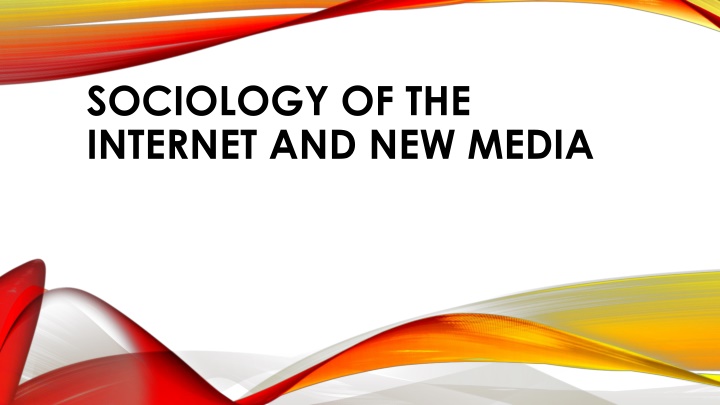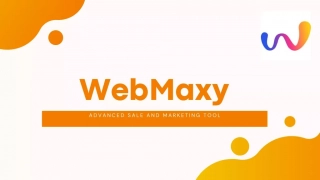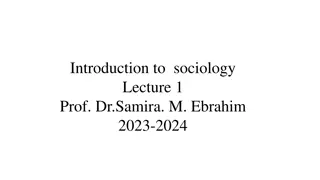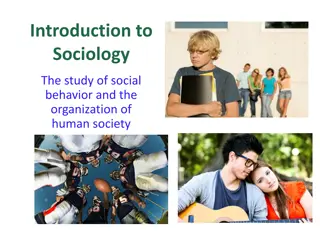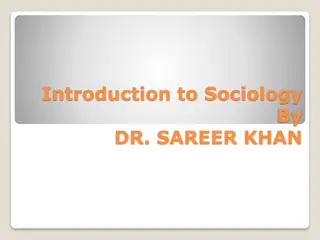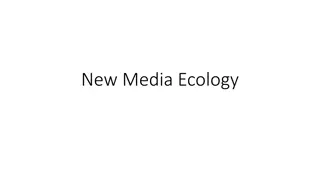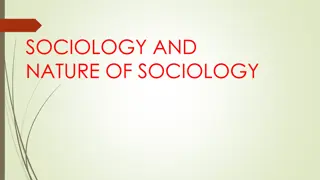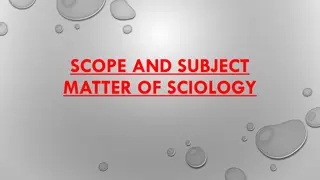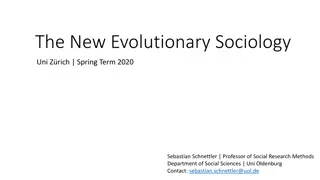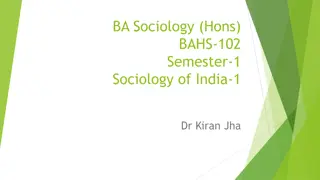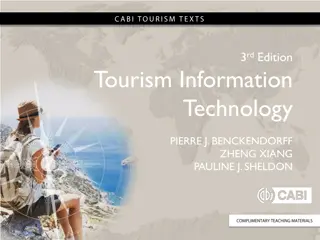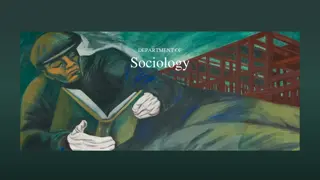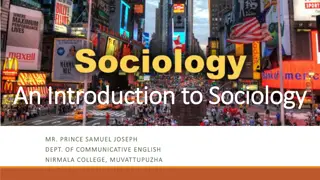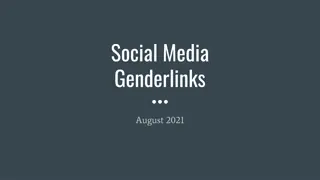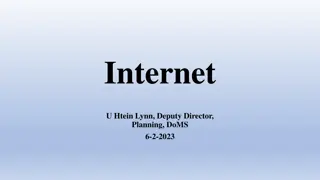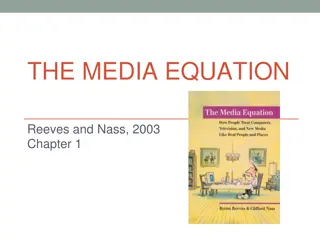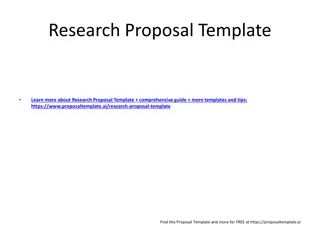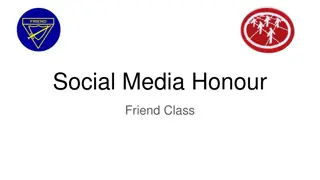Sociology of the Internet and New Media: Impact on Social Relationships
The sociology of the Internet explores how technology has revolutionized social interactions and communication. It delves into the implications of platforms like Facebook and LinkedIn, altering how we connect, share news, and network professionally. Sociologists study the societal effects of online networks, virtual communities, and cybercrime, reflecting on the changing patterns of social relationships and cultural norms.
Download Presentation

Please find below an Image/Link to download the presentation.
The content on the website is provided AS IS for your information and personal use only. It may not be sold, licensed, or shared on other websites without obtaining consent from the author.If you encounter any issues during the download, it is possible that the publisher has removed the file from their server.
You are allowed to download the files provided on this website for personal or commercial use, subject to the condition that they are used lawfully. All files are the property of their respective owners.
The content on the website is provided AS IS for your information and personal use only. It may not be sold, licensed, or shared on other websites without obtaining consent from the author.
E N D
Presentation Transcript
SOCIOLOGY OF THE INTERNET AND NEW MEDIA
How many would you call with news about an illness or invite to your wedding?
Now, how many friends do you have on Facebook?
Technology has changed how we interact with each other. It has turned friend into a verb and has made it possible to share ordinary/everyday news ( My dog just threw up under the bed! Ugh! ) with hundreds or even thousands of people who might know you only slightly, if at all. Through the magic of Facebook, you might know about an old elementary school friend s new job before her mother does. By thinking of everyone as fair game in networking for personal gain, we can now market ourselves professionally to the world with LinkedIn.
SOCIOLOGY OF INTERNET Sociology is the scientific study of society, including patterns of social relationships, social interaction, and culture. The sociology of the Internet involves the application of sociological theory and method to the Internet as a source of information and communication. Sociologists are concerned with the social implications of the technology; new social networks, virtual communities and ways of interaction that have arisen, as well as issues related to cyber crime.
SOCIOLOGY OF THE INTERNET: AN HISTORICAL OVERVIEW In the late 1990s, the sociology of the internet took shape as a subfield. The sudden widespread diffusion and adoption of the internet in the U.S. and other Western nations drew the attention of sociologists because the early platforms enabled by this technology--email, list-serves, discussion boards and forums, online news and writing, and early forms of chat programs--were seen as having significant impacts on communication and social interaction.
Internet technology allowed for new forms of communication, new sources of information, and new ways of disseminating it, and sociologists wanted to understand how these would impact people's lives, cultural patterns, and social trends, as well as larger social structures, like the economy and politics.
KEY CONCEPTS OF SOCIOLOGY AND INTERNET The public sphere By 'the public sphere' we mean first of all a realm of our social life in which something approaching public opinion can be formed. The public sphere, then, is notionally a space, one that exists and mediates between the mass and the power elite, an arena in which power is formed and directed. At its most basic, a public sphere, in order to be considered as such, must meet two criteria, namely that 'access [is] guaranteed to all' and that 'citizens have a right to confer in an unrestricted fashion' (Sparks 1998: 112). Internet has created Global Public Sphere .
ACCESS As with any improvement to human society, not everyone has equal access. Technology, in particular, often creates changes that lead to ever greater inequalities. Information poverty has become one of the core questions for the study of the internet amidst fears that its popularity is exacerbating or actually creating an information underclass. The exclusion of this underclass from the benefits of the new informational order will be long lasting or permanent.
There are two forms of technological stratification. The first is differential class-based access to technology in the form of the digital divide. This digital divide has led to the second form, a knowledge gap, which is, as it sounds, an ongoing and increasing gap in information for those who have less access to technology.
Since the beginning of the millennium, social science researchers have tried to bring attention to the digital divide, the uneven access to technology along race, class, and geographic lines. The term became common in 1996, when then U.S. Vice-President Al Gore used it in a speech.
At the end of the 20th century, technology access was also a big part of the school experience for those whose communities could afford it. Early in the millennium, poorer communities had little or no technology access, while well-off families had personal computers at home and wired classrooms in their schools.
COMMUNITY Community as a concept was at the heart of sociology's project in the nineteenth century to understand social changes wrought by the transition to the new urban-industrial society. Jenny Preece (2000) offers a list of definitions commonly used today for community, including shared goals, common interests, shared activities and governance, cooperation, satisfaction of mutual needs, enjoyment and pleasure, and location.
VIRTUAL AND ONLINE COMMUNITY Virtual communities were communities in cyberspace, that they were supported by, and existed solely in, interaction online. This opened up a space for discussion of online community as something unrelated to, and therefore perhaps opposed to, community in real life.
internet communities should be understood not as a response to changes in the offline social, but as an example of them, seeing such groups as 'a technologically supported continuation of a long term shift to communities organized by shared interests rather than shared place or shared ancestry In this emergent area, internet communities are examined with a view to understanding their internal dynamics, the forms of relationship which they facilitate or foreclose. The form of relationships decides the type of any internet community.
ONLINE IDENTITY Our habits define us. But how true is this for our digital habits?
In the early days of the internet, it was probably safe to assume that our online behaviours did not reveal much about our real-world personas. This notion was popularised by the on the internet, nobody knows you re dog caption of a famous New Yorker cartoon.
ONLINE IDENTITY From the beginning, theorists have been fascinated by the question of how we develop a persona, and interact with each other in an environment as devoid of social cues as the early internet. Sherry Turkle, whose study of early MUD users (see note p. 119) has become a landmark text.
For Turkle the 'subjective computer' differs radically from other technologies. This is in so far as people use computer and online 'tools in search of new experiences which will change their ways of thinking rather than simply as a tool to do a predetermined job. As a result cyberspace is, for Turkle, a self-consciously reflexive space, An arena where 'you are who you pretend to be'
AS per this idea, the online self is multiple, transitory and always in the process of redevelopment. The end result of this process is the development of a global 'melting pot' self. The core idea is that as we develop and express multiple characters, drawing on latent aspects of our personality and 'projecting' them into coherent personas, we come more and more to 'live in each other's brains'.
Thus she argues: 'With our relationships spread across the globe and our knowledge of other cultures relativizing our attitudes and depriving us of any norm ... Individual notions of self vanish . Drawing on Foucault, Poster argues that the 'individual is not a natural being, is not a being centered in consciousness, but is actually given shape in the interactions that occur in language and in action .
The concept of the mask Dorian Wiszniewski and Richard Coyne in their contribution to the book Building Virtual Communities explore online identity. They point out that whenever an individual interacts in a social sphere they portray a mask of their identity. The online mask does not reveal the actual identity of a person. It, however, does reveal an example of what lies behind the mask. For instance, if a person chooses to act like a rock star online, this metaphor reveals an interest in rock music. Even if a person chooses to hide behind a totally false identity, this says something about the fear and lack of self-esteem behind the false mask.
BLENDED IDENTITY This mask perspective is likened to the concept of 'blended identity', whereby the offline-self informs the creation of a new online-self, which in turn informs the offline-self through further interaction with those the individual first met online.
